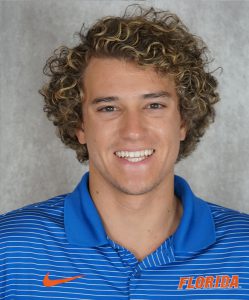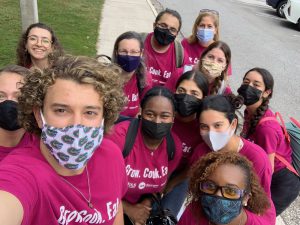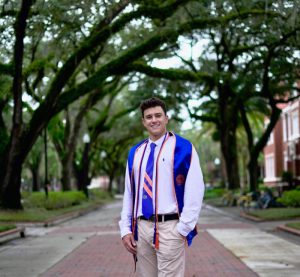 We are pleased to welcome you to our next installment of FSHN Research Journeys, which follows the research of graduate students in the Food Science and Human Nutrition program at UF. Today’s guest poster is Logan Brunson, a first-year graduate student earning his master’s degree in nutritional sciences in the lab of Dr. Karla Shelnutt. Logan is a graduate of the FSHN nutritional sciences undergraduate program. Learn about his essential work with Homestyles-2, a nutrition education program designed to support low-income families.
We are pleased to welcome you to our next installment of FSHN Research Journeys, which follows the research of graduate students in the Food Science and Human Nutrition program at UF. Today’s guest poster is Logan Brunson, a first-year graduate student earning his master’s degree in nutritional sciences in the lab of Dr. Karla Shelnutt. Logan is a graduate of the FSHN nutritional sciences undergraduate program. Learn about his essential work with Homestyles-2, a nutrition education program designed to support low-income families.
Logan: Meet Mrs. Smith. For her entire life, Mrs. Smith has lived in an underserved community and used Supplemental Nutrition Assistance Program (SNAP) benefits. She has been overweight since she was a child. Recently, her doctor diagnosed her with type 2 diabetes and hypertension. All Mrs. Smith wants to do is eat nutritiously and make sure her kids are healthy. Yet these goals feel impossible to reach due to a limited food spending allowance and a lack of resources. What if a single nutrition education program could help, breaking the cycle of childhood obesity within this community?
Childhood Obesity in Low-Income Families

Childhood obesity is a growing problem in the United States. Per the CDC, the prevalence of childhood obesity in 2017-2018 was 19.3% and affected about 14.4 million children/adolescents nationwide. Children with obesity are at an increased risk of developing chronic diseases later in life such as cardiovascular disease, type 2 diabetes, and asthma.
In addition, childhood obesity is predictive of obesity during adulthood. According to a recent study, the frequency of childhood obesity is highest (18.9%) in the lowest income households and lowest (10.9%) in the highest-income households. Developing solutions to combat childhood obesity in low-income households is difficult due to food insecurity and limited food spending resources within this demographic.
Homestyles-2 could be that solution. This education program will provide low-income families with tools to improve their health. Access to this program could be critical in ending the cycle of childhood obesity within underserved families.
What is the HomeStyles-2 Program?
HomeStyles-2 is a nutrition education and childhood obesity prevention program for SNAP-Ed eligible families with children aged 6 to 11 years old. The program’s curriculum was designed using evidence-based nutrition guidelines. It aims to help parents make low-cost changes to their lifestyles to reduce the risk of childhood obesity.
The Homestyles-2 intervention is delivered online as a six-lesson series through Florida’s SNAP-Ed program. The series offers lessons on family meals, breakfast, beverages, fruits and vegetables, and portion sizes. In addition to the lessons, facilitators give participants program guides for each lesson. The guides and lessons provide the participants with quick tips and tools to improve mealtime behaviors, diet-related behaviors, and physical activity.
Logan’s Inspiration to Help Underserved Communities

I grew up in a nutritionally underserved town. After studying nutritional sciences during my time as an undergraduate student at UF, I realized that some of the diseases plaguing communities like mine are preventable. I made it my mission to provide preventative health resources to individuals residing in these areas.
Post-graduation, I began working with the Florida Department of Health as a biological scientist performing COVID-19 contact tracing. While investigating my COVID-19 patients, it became clear that the leading factor determining the severity of their symptoms was their nutritional status. After observing the impact that poor nutritional intake and access can have on our community, I decided to continue my studies in nutritional sciences.
I wanted to select a research project that allowed me to implement a specific nutrition intervention to prevent chronic disease. After reaching out to multiple FSHN faculty, I was directed to my major professor, Dr. Karla Shelnutt, who introduced me to Homestyles-2.
Virtual Nutrition Education Can Support Underserved Families

HomeStyles-2 has the possibility of creating an enormous health transformation within communities. Previous nutrition education interventions targeted at a similar demographic have proven successful in yielding higher fruit and vegetable consumption, increased physical activity, lowered BMI, and increased feelings of food security.
The HomeStyles-2 intervention expands on these previous programs by basing the curriculum development on social cognitive theory. We believe that using theory and goal setting as a guide for nutrition education will greatly improve participants’ expectations about the outcomes of healthful behaviors. This expectation may help permanently change their weight-related lifestyle practices.
If proven effective, SNAP-Ed will include the Homestyles-2 program in its curriculum. Facilitators would teach it annually to individuals from our targeted demographic. We then plan to expand the reach of HomeStyles-2 across the country.

Testing HomeStyles-2 and Looking to the Future
Currently, we are recruiting a diverse pool of participants from 40 counties across Florida. Primary outcomes measures include weight-related parenting behaviors, weight-protective practices in the home environment, home availability of various foods, and the home physical activity environment. Results of this study will indicate whether the Homestyles-2 program is effective in improving health-related behaviors to support children’s health. Research challenges I may encounter include recruitment difficulties and participant dropout due to the COVID-19 pandemic.
My goal with the HomeStyles-2 project is to provide nutritional health resources to members of underserved communities. I hope to help establish a new way to combat childhood obesity, lowering the future risk of chronic disease within our society. If HomeStyles-2 can improve the lives of a family like the Smiths, then my entire research project will have been worth it.
Project Notes:
This study will be conducted in partnership with researchers from Rutgers University and West Virginia University. UF Extension Family Nutrition Program will aid in recruitment and provide nutrition educators to teach the HomeStyles-2 curriculum.
Logan Brunson is a first-year nutritional sciences master’s student at the University of Florida. He grew up in the small town of McIntosh, FL and obtained his B.S. in nutritional sciences from UF in 2020. He hopes to attend medical school with the goal of specializing in pediatric ophthalmology. When he is not studying, Logan can be found at the beach fishing and surfing.
References:
Byrd-Bredbenner C; Santiago E; Eck KM; Delaney CL; Quick VM; Pozzoli A; Worobey J; Shelnutt KP; Olfert MD; “Homestyles-2: Randomized Controlled Trial Protocol for a Web-Based Obesity Prevention Program for Families with Children in Middle Childhood.” Contemporary Clinical Trials, U.S. National Library of Medicine, https://pubmed.ncbi.nlm.nih.gov/34861408/.
“Childhood Obesity Facts.” Centers for Disease Control and Prevention, Centers for Disease Control and Prevention, 5 Apr. 2021, https://www.cdc.gov/obesity/data/childhood.html.
Communications, IFAS. “Food Science and Human Nutrition Department.” Food Science and Human Nutrition Dept – University of Florida, Institute of Food and Agricultural Sciences – UF/IFAS, https://fshn.ifas.ufl.edu/.
Communications, IFAS. “Food Science and Human Nutrition Department.” Nutritional Sciences Major – Food Science and Human Nutrition Dept – University of Florida, Institute of Food and Agricultural Sciences – UF/IFAS, https://fshn.ifas.ufl.edu/current-students/undergraduate/nutritional-sciences-major/.
Communications, IFAS. “Food Science and Human Nutrition Department.” Research Journeys – Food Science and Human Nutrition Dept – University of Florida, Institute of Food and Agricultural Sciences – UF/IFAS, https://fshn.ifas.ufl.edu/about/research-journeys/.
Communications, IFAS. Karla Shelnutt – Family, Youth and Community Sciences – University of Florida, Institute of Food and Agricultural Sciences – UF/IFAS, https://fycs.ifas.ufl.edu/fycs-directory/karla-shelnutt/.
“Ed Connection.” SNAP, https://snaped.fns.usda.gov/.
Florida Department of Health, https://www.floridahealth.gov/.
Rutgers University, 21 Feb. 1970, https://www.rutgers.edu/.
Sarah Meiklejohn. “A Systematic Review of the Impact of Multi-Strategy Nutrition Education Programs on Health and Nutrition of Adolescents.” Journal of Nutrition Education and Behavior, 2016, https://www.jneb.org/article/S1499-4046(16)30671-6/pdf.
“Social Cognitive Theory.” Social Cognitive Theory – an Overview | ScienceDirect Topics, https://www.sciencedirect.com/topics/social-sciences/social-cognitive-theory.
“Supplemental Nutrition Assistance Program (SNAP).” Supplemental Nutrition Assistance Program (SNAP) | Food and Nutrition Service, 16 Aug. 2021, https://www.fns.usda.gov/snap/supplemental-nutrition-assistance-program.
UF/IFAS Extension Family Nutrition Program, 22 July 2021, https://familynutritionprogram.org/.
West Virginia University, https://www.wvu.edu/.
 3
3
